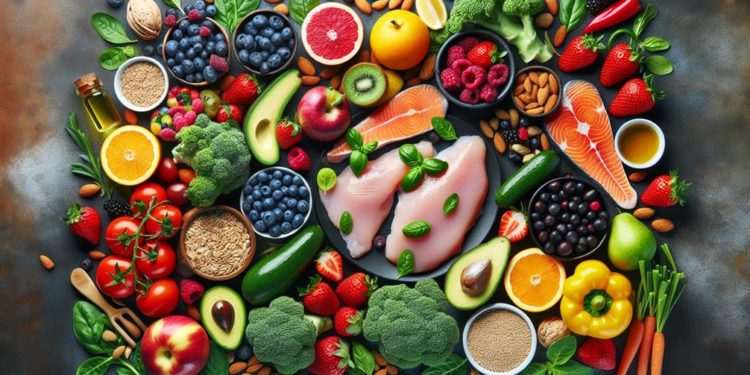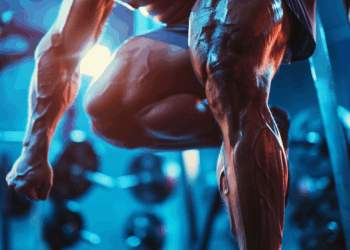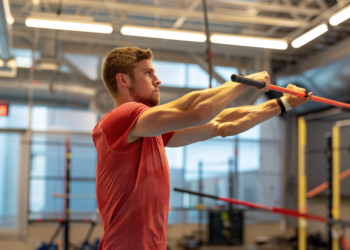Like a well-oiled machine, your body relies on the proper fuel to perform at its best. Nutrition for athletes is not a one-size-fits-all approach; rather, it is a carefully crafted combination of nutrients that can optimize your performance and aid in recovery. But where do you start? How do you know what to eat before a workout or how to refuel afterwards? In this discussion, we will explore the importance of proper nutrition, the macronutrients that fuel athletic performance, hydration strategies, pre-workout fueling tips, fueling during exercise, post-workout recovery meals, and the role of supplementation in enhancing athletic performance. Get ready to unlock the secrets behind fueling your body for peak performance and recovery.
Key Takeaways
- Proper nutrition is crucial for maximizing athletic performance and achieving goals.
- Including a variety of nutrient-dense foods ensures adequate micronutrient intake.
- Effective hydration strategies are crucial for maintaining electrolyte balance and optimizing performance.
- Protein intake is essential for muscle repair and growth.
The Importance of Proper Nutrition
Proper nutrition is crucial for athletes to maximize their performance and achieve their goals. When it comes to athletic performance, the role of micronutrients cannot be overlooked. Micronutrients, such as vitamins and minerals, play an essential role in various physiological processes that directly impact athletic performance. For example, iron is crucial for oxygen transport, while calcium is vital for muscle contraction. Including a wide variety of nutrient-dense foods in your diet ensures that you are getting an adequate amount of these micronutrients.
In addition to the type of nutrients consumed, the timing of nutrition is also crucial for athletes. Timing your meals and snacks appropriately can optimize muscle recovery and replenish energy stores. Consuming a balanced meal or snack containing carbohydrates and protein within 30 minutes to two hours after exercise can enhance muscle glycogen synthesis and promote muscle repair. Similarly, consuming a pre-exercise meal or snack one to three hours before physical activity can provide the necessary fuel for optimal performance.
Macronutrients for Athletic Performance
To optimize your athletic performance, it is important to understand the role of macronutrients in your diet. Two key factors to consider are protein intake and carbohydrate timing. Protein is essential for muscle repair and growth, making it crucial for athletes. Aim for a daily intake of 1.2-2.0 grams per kilogram of body weight. This can be achieved through sources such as lean meats, dairy products, eggs, and plant-based proteins like legumes and tofu.
Carbohydrate timing is another important aspect of fueling your performance. Consuming carbohydrates before exercise provides the necessary energy for your workout. Aim for a meal or snack containing carbohydrates and a small amount of protein about 1-3 hours before your training session. During longer workouts, consuming carbohydrates in the form of sports drinks or energy gels can help maintain energy levels. After exercise, replenish your glycogen stores by consuming carbohydrates and protein within 30-60 minutes.
Hydration Strategies for Athletes
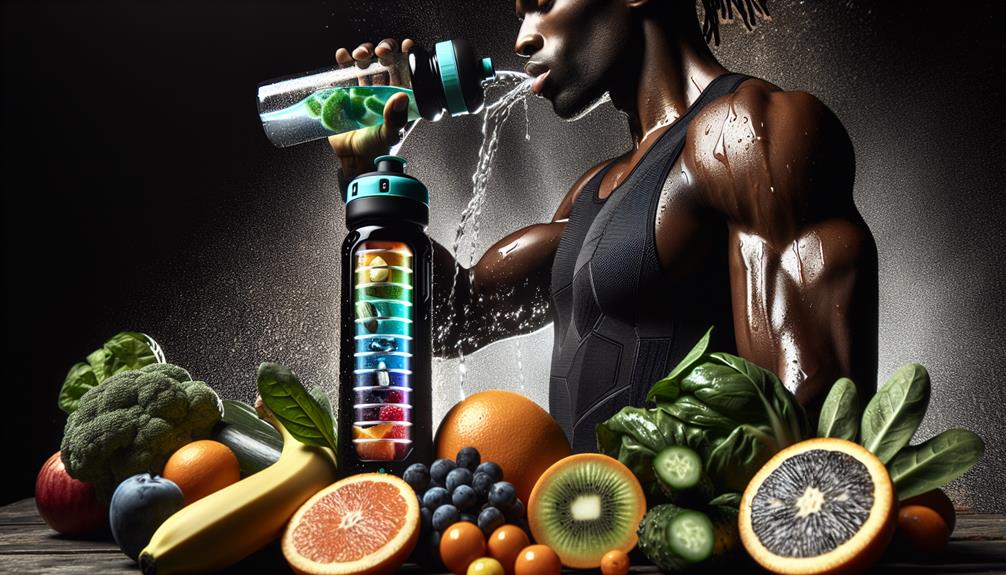
One crucial aspect of your athletic performance is implementing effective hydration strategies. Proper hydration is essential for maintaining electrolyte balance and optimizing your performance. During exercise, you lose fluids through sweat, which can lead to dehydration if not replenished adequately. Dehydration can negatively affect your performance, leading to fatigue, decreased endurance, and impaired cognitive function.
To maintain optimal hydration, it is important to drink fluids before, during, and after exercise. Water is a good choice for hydration, but for intense or prolonged exercise, sports drinks can be beneficial. Sports drinks contain electrolytes like sodium and potassium, which help replace the minerals lost through sweat and maintain proper electrolyte balance in your body.
When choosing a sports drink, look for one that provides carbohydrates for energy and electrolytes for hydration. It is also important to consider the amount and intensity of your exercise when determining how much fluid to consume. The American College of Sports Medicine recommends drinking about 16 to 20 ounces of fluid two to three hours before exercise, 8 to 10 ounces of fluid 10 to 20 minutes before exercise, and 7 to 10 ounces of fluid every 10 to 20 minutes during exercise.
Implementing effective hydration strategies, including maintaining electrolyte balance and consuming appropriate sports drinks, can help ensure optimal performance and aid in your recovery. Remember to listen to your body's thirst cues and drink enough fluids to stay properly hydrated throughout your training sessions and competitions.
Pre-Workout Fueling Tips
Maintaining optimal hydration is crucial for athletic performance, and now let's focus on fueling your body before your workout to further enhance your performance. When it comes to pre-workout fueling, timing is key. Ideally, you should aim to have your meal or snack about 1 to 3 hours before your workout to allow for proper digestion and absorption of nutrients.
Your pre-workout meal should consist of a balance of carbohydrates and protein. Carbohydrates provide the energy your muscles need to perform at their best, while protein helps with muscle repair and recovery. Some pre-workout meal ideas include a banana with a tablespoon of nut butter, a turkey and cheese sandwich on whole wheat bread, or Greek yogurt with berries and a sprinkle of granola.
In addition to timing and meal composition, it's important to listen to your body. Experiment with different foods and meal timings to see what works best for you. Some athletes find that a smaller snack closer to their workout, such as a granola bar or a piece of fruit, helps prevent any discomfort during exercise.
Fueling During Exercise
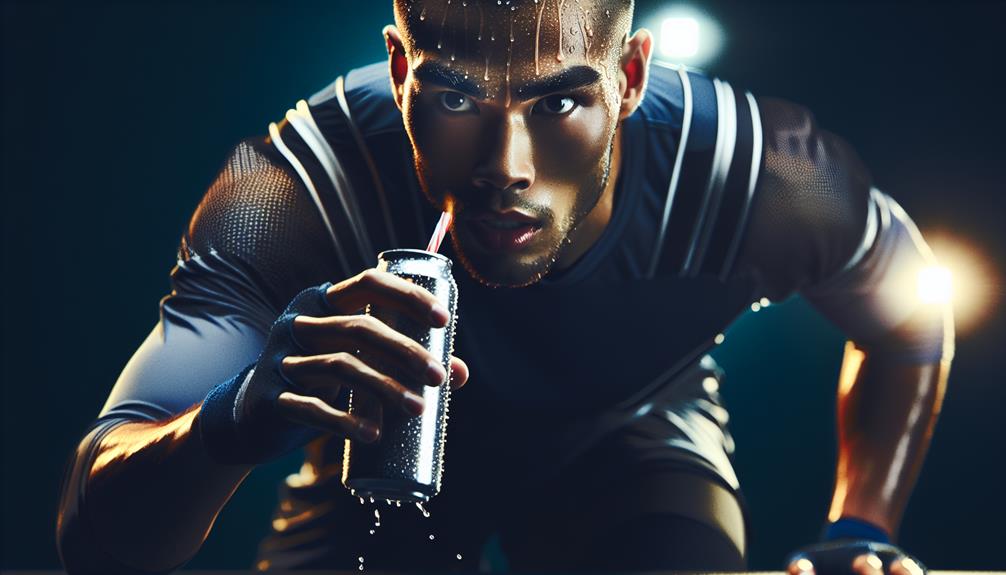
During exercise, it is essential to fuel your body with the right nutrients to sustain energy and optimize performance. Fueling strategies and proper nutrition timing can make a significant difference in your athletic performance. Here are three key points to consider:
- Hydration: Staying hydrated is crucial for maintaining performance during exercise. Dehydration can lead to fatigue, decreased focus, and impaired performance. Make sure to drink fluids before, during, and after your workout to replace the water lost through sweat. Aim to consume around 16-20 ounces of water or a sports drink every hour during exercise.
- Carbohydrate intake: Carbohydrates are the primary source of fuel for your muscles during exercise. Consuming carbohydrates during prolonged exercise can help maintain blood sugar levels and delay fatigue. Choose easily digestible options such as energy gels, sports drinks, or bananas to provide a quick source of energy.
- Electrolyte replenishment: Electrolytes, such as sodium and potassium, are essential for proper muscle function. Replenishing electrolytes during exercise can help maintain fluid balance and prevent muscle cramps. Sports drinks or electrolyte tablets can be a convenient way to replace these vital minerals.
Post-Workout Recovery Meals
To optimize your recovery after a workout, it is important to prioritize post-workout meals that provide essential nutrients to replenish energy stores and promote muscle repair. Timing is crucial for optimal recovery, and consuming a meal within 30 minutes to two hours after exercise is recommended. This window of time is when your muscles are most receptive to nutrient absorption and utilization.
To promote muscle repair, your post-workout meal should include a combination of protein and carbohydrates. Protein helps repair and rebuild muscle tissues, while carbohydrates replenish glycogen stores and provide energy for the body. Aim for about 20-30 grams of protein and 50-75 grams of carbohydrates in your post-workout meal.
Some examples of post-workout meals that meet these criteria include a turkey sandwich on whole wheat bread, Greek yogurt with berries and granola, or a protein shake with a banana. These options provide a good balance of protein, carbohydrates, and other essential nutrients.
In addition to protein and carbohydrates, it is important to stay hydrated after a workout. Replenishing fluids lost through sweat helps optimize recovery and supports overall performance. Remember to drink water or a sports drink alongside your post-workout meal to rehydrate your body.
Supplementing for Athletic Performance
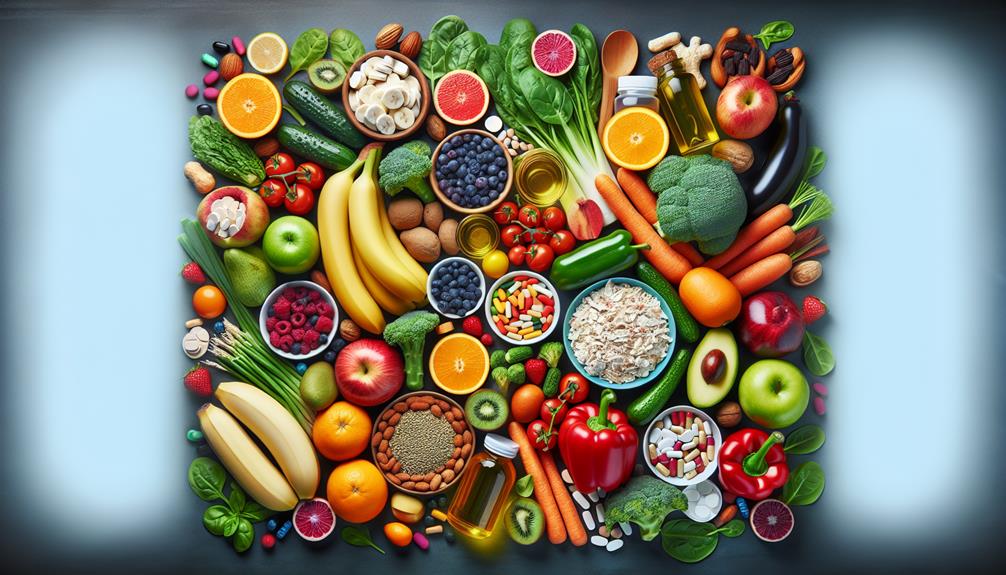
Supplementing can enhance athletic performance by providing additional nutrients and supporting various physiological processes. Sports science has shown that certain performance enhancing supplements can have a positive impact on an athlete's performance. Here are three supplements that have been widely studied and shown to be effective:
- Creatine: This supplement is known for its ability to increase muscle strength and power. It works by replenishing the body's stores of ATP, the primary source of energy for muscle contractions. Creatine has been shown to improve performance in short-duration, high-intensity activities like sprinting and weightlifting.
- Beta-Alanine: This amino acid is known for its ability to increase muscle endurance. It works by buffering the buildup of lactic acid, delaying fatigue and allowing athletes to push harder for longer. Beta-alanine has been shown to be particularly effective in activities lasting 1-4 minutes, such as swimming and rowing.
- Caffeine: This stimulant is widely used by athletes to enhance performance. It can increase alertness, improve focus, and reduce perceived exertion during exercise. Caffeine has been shown to be effective in a variety of sports, including endurance events like running and cycling.
While these supplements can be beneficial, it's important to remember that they are not a substitute for a well-rounded diet and proper training. It's always best to consult with a sports nutritionist or healthcare professional before incorporating any supplements into your routine.
Frequently Asked Questions
How Many Calories Should Athletes Consume in a Day to Maximize Performance?
To maximize your performance, athletes should consume an optimal amount of calories each day. This caloric intake is crucial for providing the necessary fuel to support your body's needs during training and competition.
What Are Some Examples of Nutrient-Dense Foods That Athletes Should Include in Their Diet?
Include nutrient-dense foods in your diet as an athlete. These foods, such as lean proteins, fruits, vegetables, and whole grains, provide essential vitamins, minerals, and antioxidants to support performance and recovery. Stay hydrated for optimal athletic performance.
Is It Necessary to Take Protein Supplements to Build Muscle and Enhance Athletic Performance?
You don't need protein supplements to build muscle and enhance athletic performance. A protein-rich diet can provide all the necessary nutrients. It's like trying to fuel a car with premium gas when regular gas is all you need.
Are There Any Specific Dietary Recommendations for Athletes Participating in Endurance Sports?
When participating in endurance sports, it's important to pay attention to dietary considerations and hydration strategies. These can help fuel your performance and aid in recovery, allowing you to perform at your best.
How Can Athletes Prevent Muscle Cramps and Dehydration During Intense Workouts or Competitions?
To prevent muscle cramps and dehydration during intense workouts or competitions, you can follow these strategies: stay hydrated by drinking plenty of fluids, especially water; consume electrolytes to maintain proper mineral balance; and stretch regularly to prevent muscle tightness and cramping.
Conclusion
In conclusion, proper nutrition plays a crucial role in optimizing athletic performance and promoting efficient recovery. By fueling your body with the right balance of macronutrients and staying hydrated, you can enhance your endurance, strength, and overall athletic abilities. For example, a case study showed that a professional marathon runner who followed a well-rounded nutrition plan experienced significant improvements in their race times and recovery rates. Remember, fueling your body with the right nutrients is essential for achieving your athletic goals.


